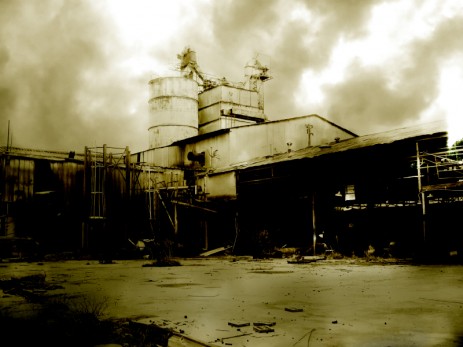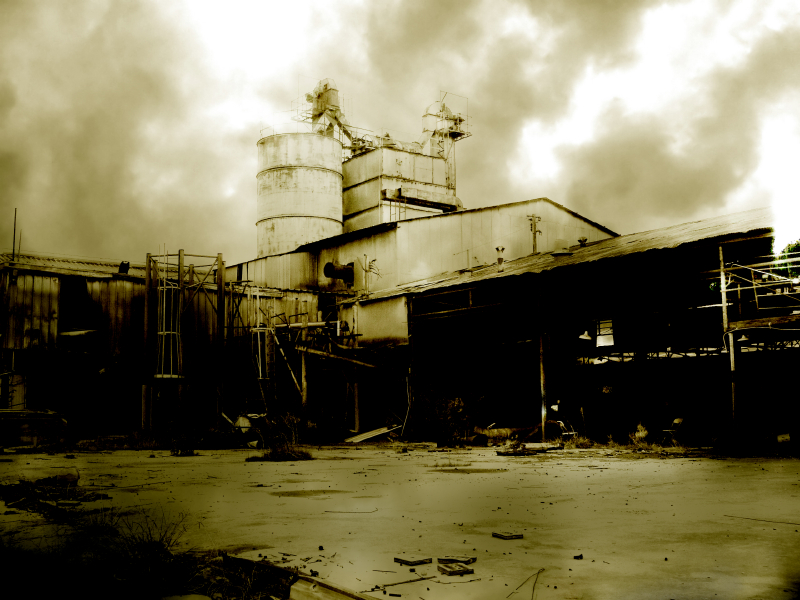Cross-posted from the NRDC Switchboard blog.
 Sen. George Voinovich is poised to launch an attack against the Clean Air Act on behalf of dirty power plants like this one.NRDC has obtained a copy of amendments that Sen. George Voinovich (R-Ohio) appears poised to lodge next week in the Senate Environment Committee to wage a sweeping attack on the Clean Air Act on behalf of dirty power plants. The amendments repeal, delay, and significantly weaken clean air safeguards that reduce power plant emissions of nitrogen oxides and sulfur dioxide (pollutants that cause smog and soot), as well as toxic mercury, arsenic, lead, hydrogen cyanide, and other acid gases.
Sen. George Voinovich is poised to launch an attack against the Clean Air Act on behalf of dirty power plants like this one.NRDC has obtained a copy of amendments that Sen. George Voinovich (R-Ohio) appears poised to lodge next week in the Senate Environment Committee to wage a sweeping attack on the Clean Air Act on behalf of dirty power plants. The amendments repeal, delay, and significantly weaken clean air safeguards that reduce power plant emissions of nitrogen oxides and sulfur dioxide (pollutants that cause smog and soot), as well as toxic mercury, arsenic, lead, hydrogen cyanide, and other acid gases.
The Voinovich amendments represent a complete rewrite of bipartisan legislation to strengthen the Clean Air Act cosponsored by Sens. Thomas Carper (D-Del.) and Lamar Alexander (R-Tenn.). That bill, entitled the “Clean Air Act Amendments of 2010,” could be brought to a vote in the Senate Environment Committee next week.
Sen. Voinovich’s amendments not only would drastically weaken, delay, and repeal crucial clean air and public health protection programs that EPA is carrying out to clean up dirty power plants that burn coal, oil, and natural gas. Adoption of these irresponsible amendments also would cripple the Carper-Alexander legislation, and in fact represent several giant steps backwards from the existing, stronger Clean Air Act.
Sen. Voinovich’s amendments represent the most systematic attack on air pollution cleanup measures for dirty power plants since the Bush administration’s failed, destructive “Clear Skies” legislation, also sponsored by the senator.
Systematically weakening the Clean Air Act is what these amendments are all about. A 5-page justification document obtained by NRDC along with the amendments identifies 46 categories of changes that the amendments represent to the Carper-Alexander legislation along with a “description”/ justification for those changes by Voinovich’s office. None of those 46 changes improves the public health or air quality features of the Carper-Alexander bill, with all 46 plainly weakening the base bill and most weakening the current Clean Air Act.
Of those changes, eight are identified forthrightly as “safe harbors” for power plants from current Clean Air Act requirements, a deceptively benign label for the loopholes and exemptions that these eight changes represent.
NRDC has prepared a document comparing the key weakening features of the Voinovich amendments to the Carper-Alexander bill as it was originally introduced, along with brief explanations where some of the amendments weaken current law.
In the passages that follow, I group the Voinovich changes into three thematic categories for discussion purposes.
Attacks on public health
The Voinovich amendments fundamentally attack the Clean Air Act safeguards that protect the public against heart and lung disease, asthma and bronchitis, cancer, and even premature death linked to smog, soot, and toxic pollution emitted by dirty power plants.
Nowhere is this more true than the amendments’ radical repeal of the Clean Air Act’s toxic pollution cleanup program. Power plants alone among large industrial polluters have evaded this program for well over a decade already, thanks largely to delay wrought by an illegal Bush administration safe harbor for power plants that was struck down in court.
The amendments repeal EPA’s authority and obligation to sharply cut power plants’ toxic emissions to the maximum degree achievable by modern pollution controls, toxic emissions including lead, arsenic, hydrogen cyanide, chlorine, dioxins, chromium, benzene, and heavy metals like nickel. (The 5-page justification document is – understandably – too embarrassed even to try to justify this egregious repeal.)
In its place the amendments require EPA to regulate only one air toxin, mercury, but even that authority is weakened by mandating pollution trading for this dangerous neurotoxin; weakening current law and the Carper-Alexander bill’s 90 percent reduction requirements; and gratuitously delaying even this weaker cleanup by three years past the outside statutory deadline under current law.
By eliminating the law’s power plant toxic cleanup program – a special deal that no other industrial sector in America ever has received, for good reason – the amendments would strike a fatal blow to legal protections that EPA must follow and currently is following in the face of a fierce utility industry lobbying blitz. These EPA measures will set rigorous cleanup standards for power plants that will cut not just more than six dozen toxic pollutants but also the deadly sulfur dioxide and soot pollution that are emitted with these toxins out of the same power plant smokestacks.
In other words, when power plants are required to clean up their toxic pollution by installing scrubbers or other pollution control equipment, the public gets double or triple the bang for its buck when the sulfur dioxide and soot pollution linked to heart and lung diseases and early deaths are reduced simultaneously. By contrast, sulfur dioxide (SO2) and nitrogen oxides (NOx) pollution trading schemes will not ensure that old, dirty, uncontrolled power plants install the pollution equipment needed to cut deadly smog, soot, and toxic pollution.
EPA is required to propose strong air toxics rules for power plants that burn coal and oil in March next year, with final rules due in November. Preventing this enormously health-protective outcome by repealing the power plant air toxics rule – and eliminating the pollution control equipment and costs they carry – is the number one objective of these amendments.
The amendments are equally irresponsible on the SO2 and NOx fronts. EPA has analyzed the Carper-Alexander bill and concluded that the three phases of increasingly tighter SO2 and NOx caps will save significant numbers of lives each year: 3,500-9,000 lives saved by 2012; 4,200-11,000 lives saved by 2015; and 5,900-15,000 lives saved by 2020. The bill is projected to avoid 2,600,000 instances of acute respiratory symptoms by 2012, 3,300,000 such episodes by 2015, and 4,200,000 by 2020.
The Voinovich amendments gratuitously delay all of those deadlines by three years, thereby denying the American people the health benefits of those stricter, earlier demands and prolonging the death toll of dirty power in this country.
Polluter protectionism
As mentioned earlier, the amendments are rife with safe harbors, exemptions, and delays designed to benefit dirty power plants at the expense of the public and air quality. But the extent to which polluter protectionism permeates every element of
the amendments is truly extraordinary.
Beginning with the Findings and Purposes of the Carper-Alexander bill, the Voinovich amendments delete every finding that associates air pollution with public health hazards and symptoms. Here are some of the representative deletions:
“(11) exposure to those particles has been associated with adverse health and welfare effects, including—
„„(A) premature mortality;
“(B) aggravation of respiratory and cardiovascular disease (as indicated by hospital admissions and emergency department visits);
“(C) changes in lung function;
“(D) increased respiratory symptoms (such as coughing, wheezing, and shortness of 7 breath);
(14) exposure to ground-level ozone can—
“(A) cause symptoms such as wheezing and shortness of breath;
“(B) inflame the linings of the lungs;
“(C) aggravate respiratory illnesses such as asthma, emphysema, and bronchitis, leading to increased medication use, school absences, doctor, and emergency department visits and hospital admissions;
The 5-page justification document’s explanation for these deletions sets the tone for the motivation behind most of the amendments: “Eliminates those findings that overstate adverse health and environmental impacts of SO2 and NOx emissions and that could be used in tort actions against power plants.”
Note first how absolutely remarkable it is that the office for a United States senator is disputing the association between air pollution and these public health hazards. Our understanding that air pollution causes or worsens these health hazards, including premature death, harkens back at least to the London smog episodes of 1952, in which up to 12,000 people are estimated to have lost their lives due to air pollution. These linkages are as well-established as any pollution hazard association in countless efforts by the National Research Council, the National Academies of Science, the American Academy of Pediatrics, the Clean Air Science Advisory Committee, and expert proceedings across the globe.
Moreover, the actual reason advanced by the document itself for striking these settled facts is to protect corporate defendants against public tort suits (think nuisance and trespass), lest Congress be seen endorsing the radical notion that air pollution is bad for people. Congress wouldn’t want to be seen favoring the truth over the prerogatives of polluter defendants in lawsuits to deny that air pollution is harmful.
This promotion of corporate interests over the public interest – and the truth – is audacious even by Washington standards.
Having set this polluter protectionist tone, the amendments then proceed to eliminate one clean air safeguard after another in sweeping rollbacks to not just the Carper-Alexander bill but the current Clean Air Act.
- The amendments repeal EPA’s authority (and obligation) to protect public health and the environment and safeguard victimized downwind state residents against SO2 and NOx emissions from power plants in upwind states.
- The amendments bar EPA from lowering power plant SO2 emissions more than the amendments stipulate prior to 2025 and prohibit deeper power plant NOx emissions prior to 2023, no matter how much they might be needed or no matter how cost-effective they are.
- The amendments eliminate the longstanding right of all states to petition EPA to require greater power plant SO2 and NOx reductions from upwind states that are fouling the air of the downwind state(s).
- The amendments replace currently required strict standards for toxic air emissions of mercury, arsenic and other metals, acid gases, carcinogenic dioxins, and the other organic air toxics emitted by coal-fired power plants, with a loosely articulated annual standard for mercury alone that allows trading of this brain poison and the creation of “hot spots” surrounding the biggest, oldest emitters. Any regulation of the other air toxics emitted by coal fired power plants is delayed for at least 10 years (with power plants already having escaped toxic standards for two decades), with no legal obligation that they ever be regulated. Oil-fired units receive the same lax treatment for their emissions of carcinogenic nickel, and the same delay (including possible amnesty) for the other air toxics they emit.
Most of these statutory repeals and exemptions also appeared in the Bush administration’s “Clear Skies” legislation.
Favoring dirty coal over cleaner electricity generation. A recurring theme throughout the amendments favors dirty coal-burning power plants over cleaner (but not clean) forms of electricity generation such as natural gas.
The amendments require EPA to use so-called “fuel adjustment factors” when distributing NOx allowances for the bill’s NOx trading regime, giving out pollution trading allowances in greater amounts to the dirtiest emitters based upon how dirty their fuels are. In clean air policy terms, this stratagem is clearly designed to reward dirty coal plants over cleaner burning natural gas power plants whose historic emissions rates of the smog pre-cursor NOx are far lower than coal plants. Rewarding the worst first and most – and coal is the worst of the emitters – is the best way to understand how the amendments pick winners and losers even within the power sector by favoring the dirtiest coal generators.
By repealing the Clean Air Act programs most responsible for finally cleaning up dirt coal plants, the Voinovich amendments perpetuate the favored grandfathered status of 40 to 70 year-old coal plants that have yet to install modern pollution control equipment. In this respect, too, the amendments favor dirty coal over cleaner burning natural gas plants that have been built within the past thirty years and installed modern pollution control equipment when they were built. These natural gas plants installed pollution controls when the law required it, whereas the sordid history of many coal plants has been to break the laws that would have eliminated their grandfathered status and required them to install modern pollution controls. Thus do the amendments exacerbate a deregulatory competitive advantage that dirty coal plants have enjoyed over natural gas plants for over thirty years.
&nbs
p; * * * * *
The unifying theme of the Voinovich amendments is the sheer audacity and breadth of weakening changes to the Clean Air Act that the amendments contain. It is as if utility industry lobbyists and lawyers were invited to proffer an irresponsible wish list of changes they would like to see made to the Clean Air Act. Indeed, reports are circulating around Washington that representatives for American Electric Power, Duke Energy and First Energy are responsible for much of the amendments.
The Voinovich amendments lay waste to the Carper-Alexander bill, with page after page of redline-strikeouts that don’t amend the bill so much as reconceive a radically different bill embodying the repeals, exemptions and delays demanded by coal plant lobbyists.
As bad and irresponsible as these amendments are, I am confident that Sens. Carper and Alexander and their colleagues on the Senate Environment Committee will strongly oppose these attacks on clean air and public health. Delaware and other eastern states well represented on that Senate committee lie at the end of the tailpipe that channels smog and soot from Midwestern coal plants to the East Coast. And power plant pollution devastates east Tennessee and Sen. Alexander’s beloved Great Smoky Mountains National Park.
Clean air and public health are too important to suffer at the hands of this dirty power grab.




